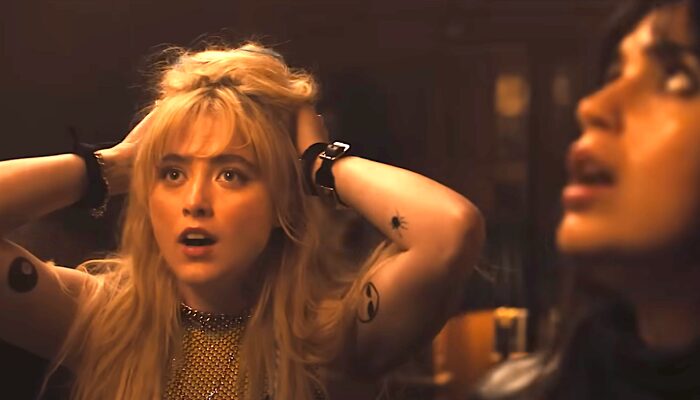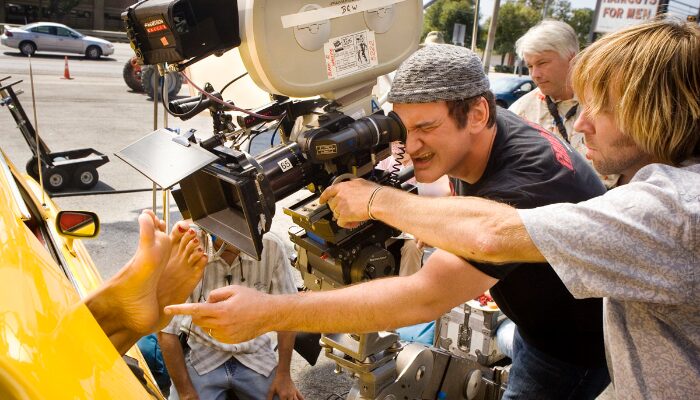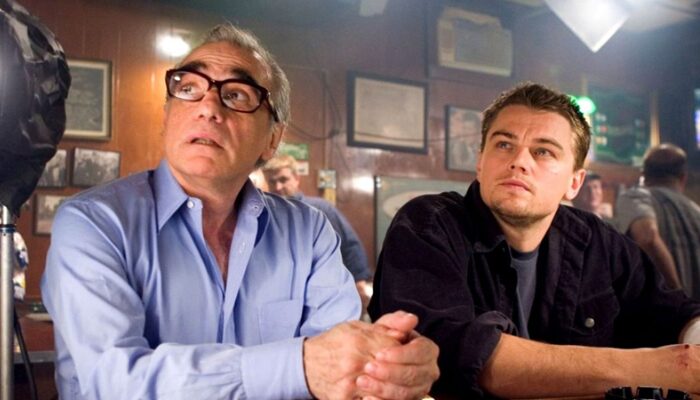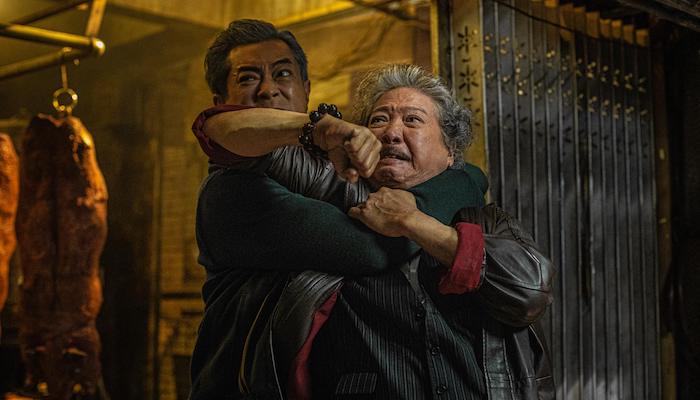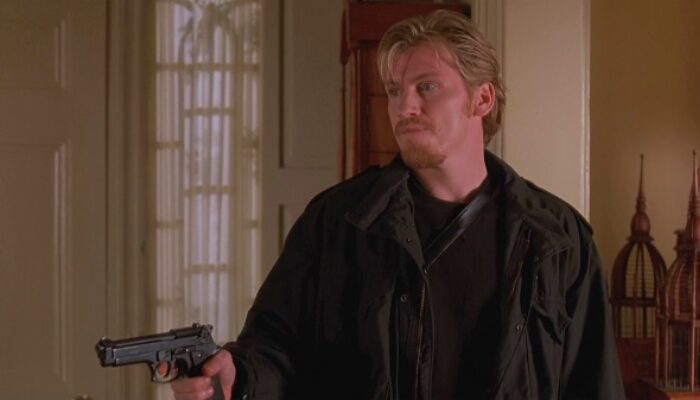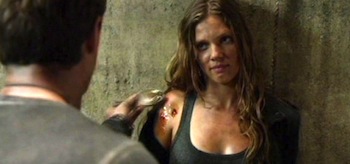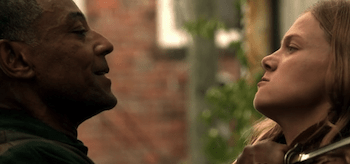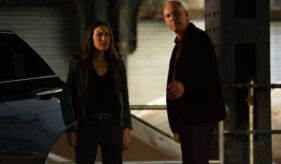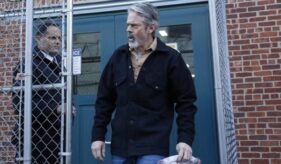TV Review: REVOLUTION: Season 2, Episode 2: There will be Blood
NBC‘s Revolution There will be Blood TV Show Review. Revolution: Season 2, Episode 2: There will be Blood picked up with Miles (Billy Burke) as a prisoner of apparent savages and Aaron (Zak Orth) trying to wrap his mind around his eleventh hour resurrection. With Charlie (Tracy Spiridakos) still after prisoner Munroe (David Lyons) and Rachel (Elizabeth Mitchell) intent on Miles’ rescue (consequently finding her way out of her season one finale funk), the stage was set to introduce or further develop the season’s new plots and players.
Recap:
Miles and the town of Willoughby’s Sheriff (Adam Beach) were taken back to the war tribe’s camp and imprisoned. Faced with dire prospects, beyond a red door no captive has returned from, they bond. Sheriff Mason got the spotlight before being taken out of the equation, in a manner meant to jar viewers into nervous insecurity; but sadly, we were not really given a reason to care. Miles managed to get loose and kill a few tribesmen. The local enforcer shut him down, however, by taking another captive from Willoughby hostage. We are introduced to Titus Andover (Matt Ross), a former Headmaster who viewed the blackout delivering him from child porn charges as divine intervention. The tribe, it turned out, was mostly comprised of his former students, allowed to grow in a state of anarchy (Miles did make a reference to Lord of the Flies, for any viewer that didn’t already catch it). For his previous escape attempt, Titus gave Miles a physical handicap. This handicap allowed for some brief bonding with the remaining prisoner, before Miles is taken beyond the red door.
Aaron’s resurrection brought conflict to what had, up to this point, been the most well adjusted set up in Willoughby. Cynthia (Jessica Collins) saw his resurrection as a miracle and wanted him to embrace it as such. As a non-believer, he rejected this, driving a wedge between them. A lucid vision of deceased Ben Matheson (Tim Guinee), and the events back at the tower, however, left him questioning both himself and the nature of miracles.
Rachel spent much of the episode trying to get a rescue party together for Miles. This allowed her to truly interact with her father, Dr. Gene Porter (Stephen Collins), for the first time since his introduction, as well as a several other residents (including Aaron). Her dedication and zeal eventually won her a posse but along the way they were met by a field of dead rats, extending as far as they could see.
Charlie (Tracy Spiridakos), in her new role as a rogue, tries to get at Monroe but was captured by his abductors. She was lightly questioned and tended to by abductor Adam (Patrick Heusinger), with an exchange of perfect smiles that screamed: “Hello, I’ll be your future love interest, this season.” Yep, for all the bare knuckle bashing that has gone on since the power went out, everyone managed to keep all of their perfectly white teeth. I can go on about Revolution‘s aesthetics, but those transgressions go beyond any one episode. Of course, I shouldn’t have been noticing them at all but the show hasn’t been offering much else.
Monroe’s two abductors turned out to be bounty hunters, tasked with taking him back to Federal authorities. Apparently, the Fed wanted him alive, which Charlie objected to, despite Monroe’s efforts to convey his remorse to her. Her concerns about him being a flight risk were ignored and she was released. When those concerns were realized, one bounty hunter was killed, Charlie returned in time to save Adam, and Monroe had to reluctantly fight her off to make good his escape.
Tom (Giancarlo Esposito) and Jason (J.D. Pardo) Neville, having switched their priority from finding wife and mother Julia (Kim Raver), to figuring out the seeming re-emergence of the U.S. Federal government, set about getting closer to its representative, Secretary Justine Allenford (Nicole Ari Parker). Tom was convinced that Allenford and the Fed had something to do with the nuclear strike and a pact, between the Nevilles and a former rebel, seemed the best bet to getting to her. Tom had a more cynical solution.
Just prior to receiving Tom, Allenford read, then burnt, a message sent to her by Titus’ enforcer. The message was sealed with the mark of the Illuminati.
Review:
It was unfortunate that Revolution‘s creative team saw fit to take it in a new direction but opted to keep all of its inherent flaws: its lack of scientific grounding mirrored by a lack of imagination or originality, its occasionally obvious ambitions hampered by poor writing and characterizations.
Miles was never meant to be an altogether sympathetic character; but I have yet to find a reason to root for him.
Rachel’s efforts to launch a rescue expedition brought her back as a contributing member of the cast, but that transition, from near total shutdown to woman-on-a-mission, seemed sudden and forced.
Aaron, while remaining the most likable character, still seemed out of place, given the show’s settings and history. A generation of post-blackout life had changed everyone. Fine, it took the events of last season to change Charlie, but she had no pre-blackout life. For Aaron to go from Google guru to survivalist, without any change- visible or otherwise- made for a stretch. The question of faith was probably introduced to mark future developments for Aaron and the nanites but seemed more like an injection fix.
Charlie, once one of the show’s most annoying characters for being a naive emo, had now become just as annoying as a violent, self-destructive emo. The problem was, Tracy Spiridakos made for an even less believable bad girl than wide-eyed idealist.
Monroe had clearly been put on a path of redemption, as his character’s evolution has thus far been handled without the subtly of, say, Ben Linus’ from Lost.
Walker, Texas Ranger and Ghostbusters were referenced but the delivery fell flat- clearly done for the audience’s benefit rather than any form of in-show interaction.
While the truth behind the red door was disturbing (though predictable), Titus and his enforcer seemed like a recycling of the Monroe/ Neville dynamic and the cult that was Monroe’s militia. The Illuminati connection between Titus’ camp and Allenford was to present an over-arching conspiracy element, likely with series wide implications but seemed all too reminiscent of Jericho to have the desired impact.
The field of dead rats was meant to be a serious harbinger of doom, but I don’t think it was really thought out. It definitely painted a starker picture than a field of dead crows but overlooked the fact that rats are considerably hardier than birds. Anything that can wipe out a rat population will likely kill off humans that much sooner. Then again, maybe we were meant to realize this just to stick around for the explanation.
The town of Willoughby, Texas has been set up as a besieged garrison, drawing parallels to the past season of The Walking Dead. Even worse, it served to anchor the cast, removing the element of uncertainty and discovery that gave season one much of its potential. As long as the series revolves around this town, a more expansive scope for the series – involving the remaining States and perhaps even the world beyond – cannot be realized.
To ingratiate himself with Allenford, Tom declared his desire to “be an American again.” All I could think of it was how there wouldn’t be a U.S.A. had the settlers shared such sentiments about being English. Power or no power, would restoring an old republic be that much more preferable to founding a better one? The Founding Fathers weren’t loyalist to The Crown, so why should we champion the restoration of the U.S.? To me, this question amounts to Revolution‘s only shot at actually being revolutionary.
Two episodes into Revolution‘s second season, and the fresh, new direction, more or less promised in the season premier, no longer seemed so invigorating.
Post-apocalyptic stories, whether by zombie, alien, or some other design, have enjoyed something of a resurgence. Back in the 80s, they were all the rage – due mostly to The Road Warrior and The Terminator, fueled by cold war fears – but that well was pretty much tapped dry. This time around – over reliance on zombies aside – the emphasis has been on exploring the post-apocalyptic landscape and the hearts / minds of survivors. Revolution has not done this. Its new direction seems to be more about mining from other shows in its genre rather than finding new ways to tell old stories or even compelling ways of telling the same stories.
For more Revolution reviews, photos, videos, and information, visit our Revolution Page, subscribe to us by Email, “follow” us on Twitter, Tumblr, or “like” us on Facebook.
Related Articles
FilmBook's Newsletter
Subscribe to FilmBook’s Daily Newsletter for the latest news!

